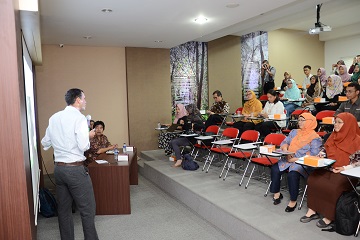IPB invites Environmentalist from Britain to discuss Forest Fire Emergency

Three work units at the Bogor Agricultural University (IPB), namely the Directorate of International Programs, IPB Center for Transdisciplinary Science and Sustainability Sciences (IPB CTSS) and the Postgraduate Multidisciplinary Study Program, held the 12th IPB Talks on Complexity and Sustainability Sciences with the theme "Sustainability Action Research" . The activity was conducted at the Tanoto Forestry Center, IPB Dramaga Campus Bogor on Thursday (2/8) and attended by 42 students from various study programs at IPB and from the Faculty of Environmental Studies of Universiti Putra Malaysia. This seminar featured Dr. Jacob Phelps from the Environmental Center, Lancaster University, United Kingdom, and Prof. Bambang Hero Saharjo from the Forest and Land Fire Laboratory, Department of Silviculture, Faculty of Forestry, IPB, to thoroughly discuss environmental issues from various perspectives.
In his presentation, Dr. Jacob explained how important the awareness of environmental experts about the meaning of studying the environment. "Studying the environment means that we must be able to take care of the environment itself," he said. Many economic activity events have a large-scale impact on the environment such as the case of oil tankers leakage in Alaska, well drilling in Mexico, burning of land in Aceh, etc.
The damage is further exacerbated by the degradation of lands which should be a supporter of environmental conservation. "We live in a dangerous environment. We must be able to classify the dangers that exist, so that losses can be minimized when environmental hazards occur," he said. He also added that the punishments given to environmental criminals currently do not provide a deterrent effect. Criminal and fine penalties sentenced cannot give significant contribution for improvement and prevention of the environmental damage. "Regulations must be made more basic and involve local wisdom," he said.
Prof. Bambang began his presentation by giving a visual picture in the form of a video about how pitiful the condition of forest fires in Indonesia is, especially in South Sumatra and Central Kalimantan. At this time the hotspots that came from great fires that occurred at several points on the islands of Sumatra and Kalimantan four years ago still cannot be extinguished. These hotspots can certainly trigger other fires should the dry season comes. "The thing that we have to think about together related to this forest fire disaster is the emissions from combustion, what substances are therein and what impacts and losses are produced." He also conveyed the big effects of this combustion which threaten the health of millions of lives in Indonesia. The adverse effects are also experienced by other countries such as Malaysia and Singapore. The smoke has even reached the United States.
"Many companies lied to us as researchers. They said that they do not burn the land and plant the oil palm with fertilizer. However, our laboratory tests proved that there was no single fertilizer content in the soil. It means that they only rely on forest burnt ash to grow their plants. The response of government agencies was also disappointing because it seemed that they did not care with what happened," said Prof. Bambang, the IPB Forest Fire Expert.
Director of the International Programs of IPB, Prof. Iskandar Zulkarnaen Siregar, believed that this IPB Talks program is very good as a means of sharing knowledge among academicians. "The discussion served is no longer monodisciplinary, but transdisciplinary. For example, we do not only discuss one aspect such ecology but also discuss issues thoroughly, even regarding the economy," he said.
According to Prof. Iskandar, this program is in line with the goals of IPB in building a multidisciplinary scientific forum, so that people from various fields can work together to solve common problems. (FI/ZSP/ris)



